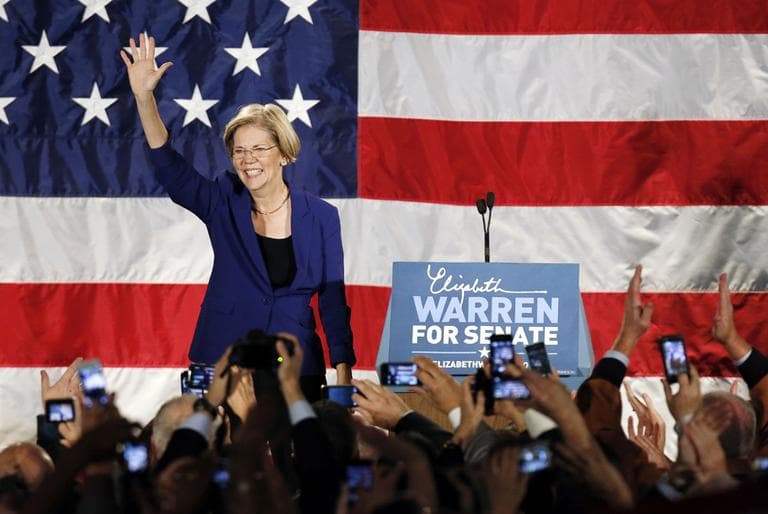Advertisement
Democrat Warren Tops Brown In Mass. Senate Race

Democrat Elizabeth Warren has been elected to the U.S. Senate from Massachusetts. Warren defeated Republican incumbent U.S. Sen. Scott Brown by an eight-point margin, 54 to 48 percent.
Warren began her career in politics by taking on Wall Street, and she promised to do the same now that she's headed to the Senate.
"To all the small business owners who are tired of the system rigged against them, we're going to hold the big guys accountable," Warren told the crowd filling the ballroom Tuesday night at the Fairmont Copley Plaza Hotel in Boston's Back Bay.
Warren was lifted by a surge of voters in Tuesday's election. When Brown won two years ago, a little over 2 million people voted. Tuesday, more than 3 million people did. Warren's team was confident early on that many of those extra million voters would fall their way.
The Massachusetts Democratic Party reached out to Democrats who had not voted in the last three elections. Many of them live in cities and are African American or Latino. And voters in some Boston neighborhoods and other cities waited in hour-long lines to cast ballots.
In her victory speech, Warren recognized the extent to which she owes her election to that grassroots effort.
“And despite the odds, you elected the first woman senator from the state of Massachusetts.”
Sen.-elect Elizabeth Warren
"This was a campaign that broke records, raising more money from small donors than any Senate campaign in the history of this country, and knocking on more doors than any Senate race in Massachusetts, an amazing campaign, and let me be clear, I didn't build that, you built that," Warren said.
That last remark, of course, was a joke about her own comments during the campaign on what makes a successful business.
Warren also recognized the historic nature of her election.
"And despite the odds, you elected the first woman senator from the state of Massachusetts," she said.
In his concession speech, Brown smiled warmly as he urged his supporters to accept defeat.
"Listen, she won it fair and square folks, and she has received the high honor of holding the people's seat and may she bring that Senate office great credit, just as I set out to do nearly three years ago," Brown said.
Advertisement
Brown remains a popular figure, but voters cited other factors as more compelling.
That was the case with Ryan Johnson, who cast a ballot for Warren in Weymouth.
"I honestly did not have strong objections to Scott Brown," Johnson said. "I'm very uncomfortable with a lot of the senator's views in other parts of the country and the power they would have if I voted for Scott Brown should the Republicans gain a majority in the Senate."

The cornerstone of Warren's campaign was that a vote for Brown was a vote for Republican control of the Senate. But Warren supporters cited other reasons to back her. Susan Smith, also in Weymouth, had several.
"I've been following her for many years, actually, before I knew she had any political ambitions," Smith said. "She's a smart lady and I'd just like to see the change. I'd like to see a woman representing Massachusetts."
Women helped elect Warren. A University of Massachusetts exit poll (PDF) found that Warren had a 20-point lead among women, while the two candidates were pretty even among men. Warren's support among women transcended the fact of her gender. Libby Williams voted for Warren in Waltham.
"She talks more about helping with education than Scott Brown," Williams said.
Brown won most of the towns he won two years ago. The difference is in the margins. Warren cut into Brown's margins in the towns on his side. But more significanctly, people who don't normally vote turned out for Warren in large numbers in the cities.
This post was updated with Morning Edition feature content. How'd your town vote?:
This article was originally published on November 06, 2012.
